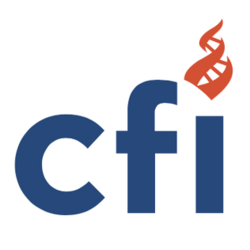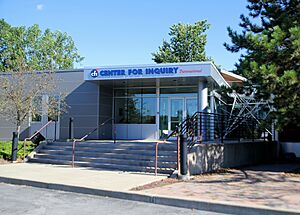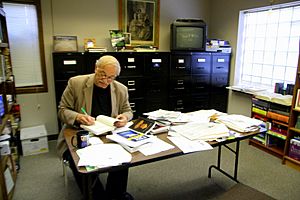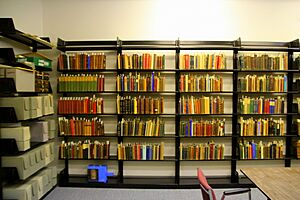Center for Inquiry facts for kids
 |
|

Headquarters of the CFI
|
|
| Founded | 1991 |
|---|---|
| Founder | Paul Kurtz |
| Type | Nonprofit, science education |
| Focus | Public understanding of science, secular ethics, skepticism |
| Location |
|
| Method | Research, education, outreach, and advocacy |
|
Key people
|
Robyn Blumner Barry Karr |
The Center for Inquiry (CFI) is a group in the U.S. that works to help people understand science better. They also try to stop the spread of ideas that aren't based on science, like pseudoscience or claims about the paranormal. CFI also works to keep religion separate from government.
Contents
What is the Center for Inquiry?
The Center for Inquiry was started in 1991 by a philosopher and author named Paul Kurtz. He brought together two other groups he had founded: the Committee for Skeptical Inquiry and the Council for Secular Humanism. CFI became a registered nonprofit organization in 2001.
Paul Kurtz, who was a humanist, led CFI for many years. He wanted CFI to offer a positive way of thinking that wasn't based on religion. In 2016, Robyn Blumner became the new CEO when CFI joined with the Richard Dawkins Foundation for Reason and Science.
Investigating Strange Claims

One of CFI's main parts is the Committee for Skeptical Inquiry (CSI). Through CSI and its magazine, Skeptical Inquirer, they look into claims about things like psychics, ghosts, UFOs, and creationism. They also check out claims about vaccines, cellphones, and alternative medicine to see if they are based on science.
CSI focuses on religious beliefs that can be tested, like faith healing. They do not look into religious beliefs that cannot be tested, such as whether God exists.
The Investigations Group
The Investigations Group (IIG) is a volunteer team at CFI Los Angeles. They do experiments to test unusual claims. They even offer a large cash prize of US$500,000 if someone can successfully show a supernatural ability.
IIG also gives out awards called "Iggies" for good scientific and critical thinking in entertainment. They have investigated things like "power bracelets," psychic detectives, and even a 'telepathic wonder dog'.
Religion, Ethics, and Society
CFI encourages people to think critically about world religions and their effects on society. They look at issues like religious extremism and how religion can cause violence. They also support humanistic ways of thinking about right and wrong that are not based on religion.
CFI has protested against religious unfairness around the world. They also work against special benefits for religious groups, like tax breaks for clergy in the U.S. They have won lawsuits to allow weddings to be performed by people who are not religious leaders or government officials.
CFI supports secular education, which means education that is not religious. They hold conferences, including "Women In Secularism," and provide places for other groups to meet. CFI also helps educate people who think freely by sending books to prisoners.
They actively support free speech and a government that is not influenced by religion. They also speak out against religious groups having too much power in the military. CFI publishes a magazine called Free Inquiry.
Special Programs and Projects
Secular Rescue
CFI has an emergency fund called Secular Rescue. This fund helps people who are escaping countries where they are treated badly for not being religious. Between 2015 and 2018, Secular Rescue helped 30 people find safety.
Office of Public Policy
The Office of Public Policy (OPP) is CFI's group in Washington, D.C. They work to influence laws and policies related to science and secularism. This means they try to protect the separation of church and state. They also promote using science and reason to make public decisions.
The OPP shares its views on topics like acupuncture, climate change, and intelligent design. They also help with legal cases by providing experts for Congress and writing legal opinions for Supreme Court cases.
Master of Education Program
CFI works with the State University of New York at Buffalo to offer an online Master of Education degree. This program teaches students about science, how it connects with public life, and how to communicate scientific ideas. It's for people who want to work in science education, public policy, or science journalism.
Quackwatch
In 2020, Quackwatch, a website that exposes false health claims, became part of CFI. CFI plans to keep its websites running and use its founder's library.
ScienceSaves
ScienceSaves is a campaign to help people appreciate the importance of science. They started National Science Appreciation Day in 2022, which happens every year on March 26. Many states have officially recognized this day.
Teacher Institute for Evolutionary Science
This program helps teachers learn how to teach evolution in schools.
Richard Dawkins Award
The Richard Dawkins Award is given out every year. It honors a person from science, education, or entertainment who publicly supports secularism and rational thinking. The award is named after Richard Dawkins, a famous evolutionary biologist.
Past Programs
Camp Inquiry
CFI used to organize a summer camp for children called Camp Inquiry. It focused on science, critical thinking, and humanist ethics. The camp encouraged kids to think for themselves and understand how things work, even spooky stories.
CFI Institute
The CFI Institute offered online courses and workshops for college students. These courses taught critical thinking and how science affects religion and human values.
Medicine and Health
CFI also had a group that looked closely at "New Age" medicine and certain types of therapy. CFI believes healthcare should be based on science and challenges claims made by alternative medicine.
Where CFI is Located
CFI is a nonprofit charity in the United States. It has 17 locations in the U.S. and 16 international branches or partner groups. Their main office is in Amherst, New York. They also have offices in places like Los Angeles, New York City, and Washington, D.C..
International Work
CFI works with groups around the world through its "Center For Inquiry Transnational" program. CFI also has a special role at the United Nations, where they speak up for human rights and participate in debates.
Centre for Inquiry Canada
The Centre for Inquiry Canada (CFIC) is CFI's branch in Canada. It started with help from CFI but is now an independent Canadian organization. It has branches in several Canadian cities.
CFI in the News
CFI often takes part in discussions in the media about science, health, and religion. They have a campaign called "Keep Healthcare Safe and Secular" that promotes healthcare based on science. They speak out against medical practices that are not scientific.
In 2006, CFI opened an office in Washington, D.C., and said that public policy should be based on science, not faith. The Washington Post wrote an article about it called "Think Tank Will Promote Thinking."
In 2011, an expert from CFI Los Angeles helped show how a supposed "angelic apparition" at a hospital was actually just sunlight from a hidden window.
Challenges and Free Speech
In 2016, some people criticized CFI and the Richard Dawkins Foundation for not having enough diversity on their boards.
In 2011, a country club canceled an event with Richard Dawkins because they misunderstood his book. CFI argued that this was unfair and went against basic American principles of not discriminating based on beliefs. CFI later won a legal case about this.
CFI has also been involved in legal cases about government funding for religious programs.
At the UN Human Rights Council, a CFI representative was interrupted by the Saudi Arabian delegation. CFI was speaking about free speech and criticizing how Saudi authorities treated a blogger for his views.
Blasphemy Day
CFI started "Blasphemy Rights Day International" in 2009. This day encourages people to openly share their criticism of religion. It happens every year on September 30. CFI believes that religious beliefs should be open to discussion and criticism, just like political beliefs. This idea has caused some debate, but CFI stands by its support for free speech.
See also
 In Spanish: Center for Inquiry para niños
In Spanish: Center for Inquiry para niños
 | Chris Smalls |
 | Fred Hampton |
 | Ralph Abernathy |




